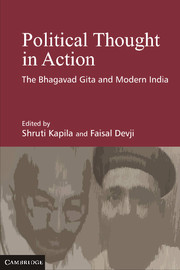Book contents
- Frontmatter
- Contents
- List of Contributors
- Acknowledgements
- Introduction
- 1 India, the Bhagavad Gita and the World
- 2 The Transnational Gita
- 3 The Transfiguration of Duty in Aurobindo's Essays on the Gita
- 4 Gandhi's Gita and Politics as Such
- 5 Gandhi on Democracy, Politics and the Ethics of Everyday Life
- 6 Morality in the Shadow of Politics
- 7 Ambedkar's Inheritances
- 8 Rethinking Knowledge with Action: V. D. Savarkar, the Bhagavad Gita and Histories of Warfare
- 9 A History of Violence
- Index
6 - Morality in the Shadow of Politics
Published online by Cambridge University Press: 05 January 2014
- Frontmatter
- Contents
- List of Contributors
- Acknowledgements
- Introduction
- 1 India, the Bhagavad Gita and the World
- 2 The Transnational Gita
- 3 The Transfiguration of Duty in Aurobindo's Essays on the Gita
- 4 Gandhi's Gita and Politics as Such
- 5 Gandhi on Democracy, Politics and the Ethics of Everyday Life
- 6 Morality in the Shadow of Politics
- 7 Ambedkar's Inheritances
- 8 Rethinking Knowledge with Action: V. D. Savarkar, the Bhagavad Gita and Histories of Warfare
- 9 A History of Violence
- Index
Summary
The story has often been told of Gandhi putting an end to the first and arguably most successful experiment with civil disobedience across India in 1922, after some of his followers burnt to death nineteen policemen trapped in their station at a place called Chauri-Chaura. Explanations of why the Mahatma should have called off a movement that was enjoying extraordinary success include, on the one hand, his fear of losing control over its potentially revolutionary drift, and on the other his realization that the Indians who took to all manner of violence during the satyagraha were not quite ready for their freedom. I am interested neither in the communist theory of Gandhi as an agent of some bourgeois nationalism desperate to rein in the people's revolutionary impetus, nor, for its part, in the liberal theory of a people too immature for independence. Such explanations cannot account for awkward details like the fact that no situation could be very revolutionary that was stopped by a man to whom no police or military force was available, or the fact that Gandhi had consistently demanded immediate self-rule and always rejected the claim of India's being unprepared for independence.
Non-violent protest was, for the Mahatma, not a means but an end in itself, one that stood apart from politics conceived as a practice of conjuring up some future. While such forms of civil disobedience had political consequences, in other words, their purposes were achieved in the very moment of expression rather than subsequently.
- Type
- Chapter
- Information
- Political Thought in ActionThe Bhagavad Gita and Modern India, pp. 107 - 126Publisher: Cambridge University PressPrint publication year: 2013
- 1
- Cited by



